Cruel Burning Man
You might think you’ve peeped the scene. You haven’t. The real one is far too mean.
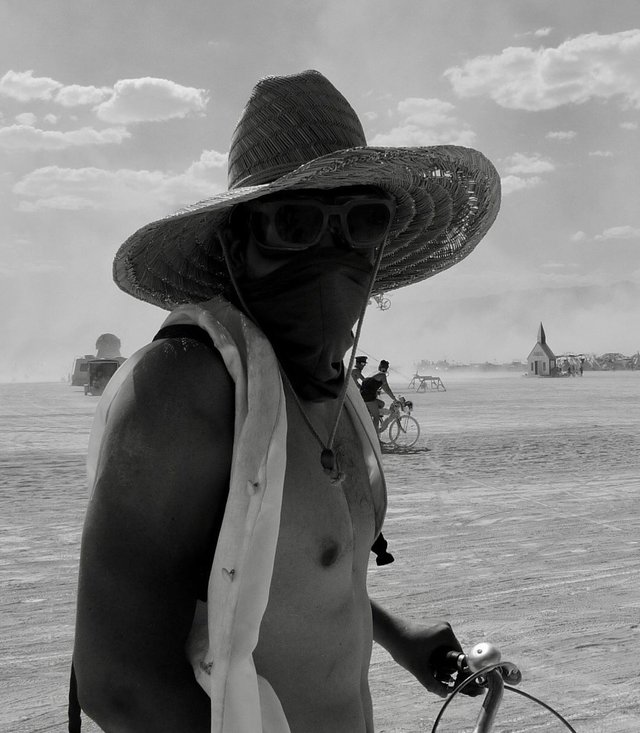
An explorer’s currency is the alleviation of fear of the unknown. He achieves this by going out into the unknown, breaking off bits of it, and returning with them—making the unknown less unknown.
There aren’t many unknowns left. It’s not very heroic to explore Earth anymore. Exploring the digital world is newer, but similarly uninspiring.
There have been attempts to force unknown spaces, or voids, into the fabric of society. Destination-less walks suggested by Situationists. Mmorpgs. Weird sex cults. Extreme haunted houses. But these are gimmicks, the facades of voids masking the familiar.
Trapped on a settled Earth, I see only two ways to find real voids. Inner voids are best achieved via drugs. Outer voids are tougher. You can stumble into one, finding yourself suddenly at the scene of a mass shooting*, for example, or you have to build your own void on top of the existing world. Then you have to be brave enough to leave it alone, to resist the temptation to dictate what fills it in, to keep the void a void. This is what Larry Harvey has achieved with Burning Man.
Vulnerable
The void is often represented as hell, which is why it is the essential for many of the greatest explorers—Odysseus, Virgil, Jesus for e.g.—to go through hell (or at least death itself) before returning home. The inscription above the entrance to hell reads “Abandon all hope, ye who enter here.”
Indeed, the entering of any true void requires the abandonment of hope, or at least the temporary forgetting of it. But hope is a persistent little bird. Letting go of hope means letting go of life and making yourself vulnerable to death. In previous, more primitive worlds this was mostly a bad thing. In our current one—one in which fear is a vestigial structure—it’s mostly a very good thing.
Underneath fear, if you can plummet that far, is pure vulnerability. Here you find moments of ecstasy, your soul finally taking a much deserved rest from its constant and completely misguided battle for survival. Where explorers of old could rely on fear as a tool, explorers today must eschew it entirely.
A woman in my camp told us a story. She was a rough-edged dancer, someone who had experienced the wrong side of the tracks and somehow made it back to the elite. She had just returned from a long night of partying, and still had her party clothes on, midriff bared, eyelids purple. She was bleary but excited.
She described how she had “begun her day,” although what she actually meant was how she had begun yesterday, as a full 36 hours or so had passed since she left camp (needless to say, days at Burning Man begin to lose their structure). In any case, she had gotten up early and attended a vulnerability workshop alone.
It consisted of a man speaking in front of a small audience in a tent. He disrobed and asked the audience to yell things at him, the worst things they could possibly think of. People shouted insults about his flabby belly, his balding head. Someone yelled “You have a small dick!” Then he turned around, bent over, and spread his ass cheeks towards the crowd. He told them to keep yelling.
After it was over, the man asked for volunteers. The woman from our camp was the first to raise her hand. She stripped down and the group of strangers began insulting her body. Then the host added a wrinkle. Not only were they to insult her body, they were to insult her personality as well, gleaning what they could about it from the way her body looked.
She described the experience as “freeing.”

Our Camp. Photo by Ivan Cremer
I haven’t cried in 15 years, but I cried three times in my final twenty four hours on the Playa.
#1:
I cut tire tracks through the white moon dust. I make it to Center Camp where coffee is $3 and yellow electrolyte drink is $3.50, the only things for sale on the Playa besides ice. Center Camp still retains some hippiness, colorful homemade wood furniture, paintings of flowers and fractals, a statue of an oversized green guitar. Dirty bodies lay on pieces of couch cushions around a center ring. It’s around 7am and it feels like I’m the only one awake although I’m not. Everyone else is also awake, in their tents, creasing their dust covered-eyes, peeking out in amazement that they’re still alive.
It’s Friday, my last full day, and I am full of gratitude. I am so overwhelmingly grateful to not be one of the twitchy, black-eyed souls stumbling through the streets, debating whether a coffee will increase or decrease my terror as the heat ramps up to the hundreds. I am not one of them because I thankfully, blissfully slept last night; my second real sleep of the week. I totaled about twelve hours of sleep in seven days, probably closer to twenty if you count hallucinations.
I sit down with my coffee and electrolytes. A man in all fur stumbles through the camp and hands me a licorice. There’s a makeshift theater. A couple old men are passed out on the benches accumulating dust. On the stage there is a bald man. He is playing the bagpipe.
My throat swells up with that pre-crying feeling. This happens sometimes when I listen to music, but I can always choke it back down. This time I don’t choke it down, I just sort of keep breathing and I feel my eyes get wet. The bagpipes blow. I think about my grandmother’s funeral. Red-faced, blue-eyed WASPs refusing to cry. This bagpiper is hitting me right in my genes.
I ask if the bagpiper will play Amazing Grace one more time. His fingers turn white as he presses the keys. I isolate the welled-up feeling in my throat and, instead of swallowing and tightening, I breath into it and try to let it loose. My eyes get heavier, and it feels like a mask underneath the skin of my face is melting and distorting. My throat spasms for a second, the smallest sob, and then re-tightens. The bagpiper finishes the song and, tomato-faced, comes to attention and salutes. His lip is quivering. There are tears in his eyes too.
I cycle out of the Center Camp and towards the Playa in the direction of the Temple where many more people will be crying—they seem to cry and clutch each other in there for days—but these cryers aren’t like me. They’re the sort that cries all the time.
I pass a woman cycling alone, lollygagging, drawing zig zags with her tire in the moon dust. She sees me coming and her bike straightens into control. She gives me a crazy smile, looks me right in the eye, and says “goodbye.”
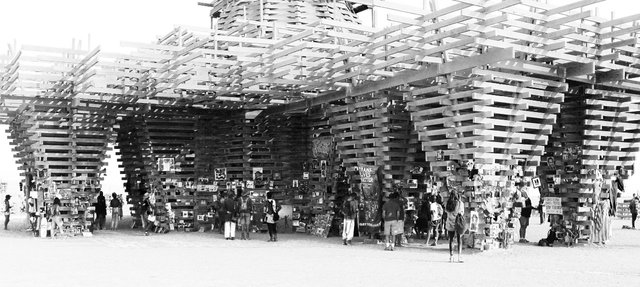
Photo by Ivan Cremer
Happy people know a secret about life. We’ll never tell it to you and we couldn’t tell it to you even if we wanted to. You won’t find it in a self help book, in fact anyone who offers to tell you the secret is a liar because, as I just said, it’s not tellable. You can find partial reflections of it glinting like light off a prism in the work of some extremely rare poets, the ones who don’t commit suicide, generally the ones they call sick or insane. You can find it in the work of Charles Bukowski and Frederich Nietzsche. You can find it in the work of Knut Hamsun and Ernst Junger and very occasionally in Dostoyevsky. You can find it in the work of rappers like Shawn Carter and Kanye West, and to a lesser extent in the work of Tupac Shakur. But, with regard to the latter, there is something else. An ugly tattoo forming an arch over his navel. You can find it there too.
Self Ownership
Burning Man perfectly marries Boomer piety with Millennial anemia. It is gorgeous in its laziness. It is incisive in its blindness. It is honest in its contempt for wants and needs. In other words, Burning Man is not utopia, it’s not a society that strives for equity in any way. It’s the opposite. Burning Man is something closer to the state of nature, it is a void. And there a cruel freedom reigns. I can’t help but believe that the genius of this emanates from Larry Harvey. People assume he’s a hippy, but that couldn’t be further from the truth. Larry is neither Boomer nor Millennial. He’s a Gen X libertarian.
There are no trash cans and there is no trash on the ground. Each time I returned to my tent, I would expel handfuls of cigarettes butts, crumpled beer cans, and ash onto a tarp I used as a door mat. If you do litter, or piss, or denigrate the Playa in any way, you will run up against a severe social enforcement mechanism. You will be aggressively yelled at. You will be excluded, thrown out, have your face gotten into.
The law of the Playa is undergirded by a principle, a feeling really, of self-ownership. Radical Self Reliance is the most oft-cited of the 10 Burning Man Principles. It is also the one, in my experience, that has the strongest effect on the environment. It is why, when you arrive at Burning Man for the first time, veteran Burners greet you by saying “Welcome Home.”
The art cars are mind control robots. They infiltrate your brain with inhuman music, matrix-like, which turns people into zombies. The sounds themselves are sinister, inhuman, shrieking sirens, alarms coming from deep within a computer. Haunting in the coldest sense of the word. Doppler effects. Dive bombers. The beating of a Robot Heart.
The Driving Force
The sights and sounds of Burning Man are overwhelming. It is a decentralized moon carnival full of stuff that you have never imagined. I saw a three-story marionette walking across the Playa guided by crane. I saw a similarly massive tesla coil shoot electricity across a distance of at least 20 feet, in tempo with music. I saw people groped in a grope box, and fondled in an 300 person shower. I rode a yacht across the desert and lavished in a colossal womb of pink fuzz. I drank at bars that wheeled up to me and danced at clubs that I had to chase. Every piece of art on the Playa was, in my opinion, more fascinating and worthwhile than any piece of art I have seen in a museum, with perhaps the sole exception of the 2012 Damien Hirst retrospective at the Tate in London.
The spectacle is so beautiful and stimulating that it made me curious about the reason it exists. None of the artists and camp-builders are paid to build what they build, and all have to fund their projects themselves, with the exception of a small handful who receive grants. Not even the rockstar DJs on the famous art cars Robot Heart and Mayan Warrior get paid.
We are raised to think transactionally. All our motions are tied to the exchange of currency. This is an incredibly obvious observation, but when the reality of it is suddenly removed, it’s striking. When I approached my first bar on the Playa, as I waived over the bartender I was struck with a sudden pang of fear. I had absolutely nothing to give her. My drinking, something that I rely on quite heavily in high stress situations like my first night at Burning Man, existed entirely at her whim. It was a slightly terrifying feeling, this loss of control, one that took some real getting used to. Burning Man is not, as is often cited, a “barter economy.” It’s not like you go around trading furs for spices and sandwiches for beers. It’s a gift economy. Everything is free. You just have to make people want to give it to you.
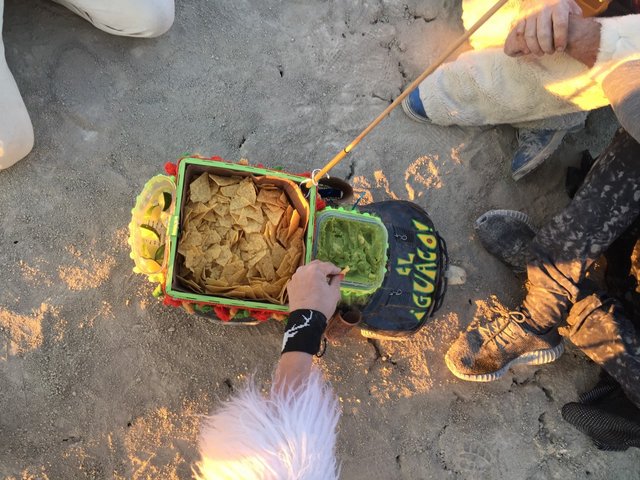
Photo by Ivan Cremer
I don’t believe, however, that Burners give out of altruism or even a sense of beneficence. People want to give you what they want to give you, not the things you need (just try asking around one of the more crowded bars for a cup of water). Remember, Radical Self Reliance is written into the burn’s DNA.
My theory, crass and banal as it may be, is that the currencies of Burning Man are desire, pleasure, sex, and status. In the real world, we have money, which acts as an indicator of status and thus desirability. At Burning Man, this middleman is cut out. Your value in the sexual marketplace is not dictated by what you’ve earned, but by what you’ve built.
One morning after Robot Heart, my campmates and I took the land yacht art car back to Bubbles and Beats. We caught it moving, running alongside and throwing our bikes up on the hooks. The sun rose softly. My brain was crystal clear. Acid generally makes me see things with a kind of stripped away purity.
At Bubbles and Beats, a young blonde woman wearing a sort of off the rack version of the white bathing suit from Fifth Element approached me and said I looked familiar. She found ways to subtly ask me for drugs. She introduced me to her friends. One of them had a DMT pen, but he wouldn’t let me try it.
On a nearby couch, two young women with glazed over eyes were kissing and rubbing each other’s thongs. A Persian girl in a see through white body suit, one of the blonde’s friends, gave me some water because I was dry. I sucked on her high end camel back for sixty seconds.
They invited me to a camp known for hosting one of the oldest bars at the burn. They were serving Bloody Marys, but very weak, watery attempts at them. It was a shoddy, run down set up run by shoddy, run down men, thick with drug fever.
Behind the bar was a scraggly man, probably late-50s or early 60s. He wasn’t interested in talking to me, or any of the men there, and he was barely able to make eye contact with us he was so focused on the girls, distractedly filling me up with awful bloodies whenever I rattled my cup. With great energy, though, he questioned the women and made dirty jokes to them, which they laughed at generously.
After awhile of this, he pulled something out of his pocket and showed it to them, but I couldn’t quite see what it was. They made excited sounds and then disappeared into the back with him before I could ask what was happening. Bars at Burning Man are always connected to the camps of the proprietors, so by “back” I mean behind the bar, into the array of RVs, tents, and shade structures that made up the camp.
After awhile, I asked another bartender if I could go back there and at least tell the girls that I was leaving.
“Uh yeah this is _____’s camp and it’s his call, but yeah it’s private back there.”
Blocking entry to a part of Playa, any part, is roughly against the rules—a violation of the principle of Radical Inclusion—but it’s the rule I saw broken most often. The notorious Plug and Play camps, essentially elaborate hotels set up for rich people who pay upwards of $10,000 for the week, all find ways to separate the wheat from the chaff.
But I pressured and, like most veteran Burners would, the gatekeeper acquiesced and allowed me to walk back into the camp area. The camp was low slung and segmented. There was a long, flat shade structure with a tent city underneath it. Searching the tent city, I heard cackles coming from a small blue tent in a corner. I walked over and knelt down to look inside.
In the corner of the tent the girls were lying, red eyed, laughing hysterically. The zippered front flap hung half open. Also inside was the old bartender, apparently the owner of the camp, and an even older man, probably in his mid-60s. This second man gave me a stern, unhappy look, disgusted that I may have arrived to break up his party. The owner was partying.
“Oh hello!” the owner said. “We’re doing dissociatives!”
They were sucking whippets out of an industrial whipped cream canister. The blonde made eye contact with me, her sky blue eyes excited but totally vacant, almost written over with red. I asked what was up. They responded with incoherent peeps and giggles. Then there was awkward silence. I felt like a father barging into a party I wasn’t invited to. The owner’s attitude suddenly changed to one of great irritation.
“You know what,” he said. “I don’t know about you, but it’s getting pretty hot in here.” He raised his eyes at me, hinting strongly that I should get the fuck out of there. I told girls that if they wanted to go, now was the time. They didn’t budge.
I wound my way back to the bar and waited for a few minutes, staring angrily into the camp, but the girls never reappeared.
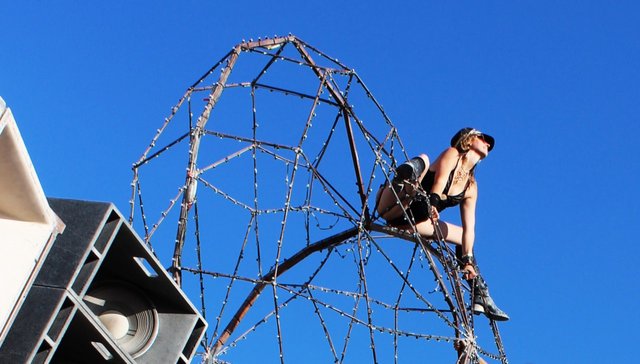
Photo by Ivan Cremer
The driving force behind the unbelievable spectacles at Burning Man is, I believe, self-reproduction. The sights at Burning Man are so moving, so shocking, because they are so unique. In the contemporary world, existing institutions are often the only ones with the freedom to create. All bars begin to feel the same. All restaurants begin to taste the same. All art begins to look the same. At Burning Man, the drive to create is freed and decentralized. You have a void-space to settle and build your own camp/bar/party/identity. An old man with a little bit of money can become the scuzzy bar owner he’s always wanted to be, and bang just as many girls as he would’ve in this alternative life. An accountant can become an architect. A coder can start a fraternity. People who have dedicated their lives to being red tape can finally be what they were too cowardly to pursue in real life.
Burning Man is full of the most beautiful women in the world, and they are for the most part suddenly naked. These new identities, both male and female, compete for the status and thus the affections of each other. Of course most of them would never admit this, but how could the freedom inherent to the void—the unbridled and uninterrupted drive to impress potential sexual partners by men who in the real world do not have the opportunity to do so— not be a powerful engine? Burning Man is a colossal simultaneous outpouring not of sex, but of productivity-toward-sex. Camps are Bower Bird nests. It is a cauldron of laboring Tantaluses.
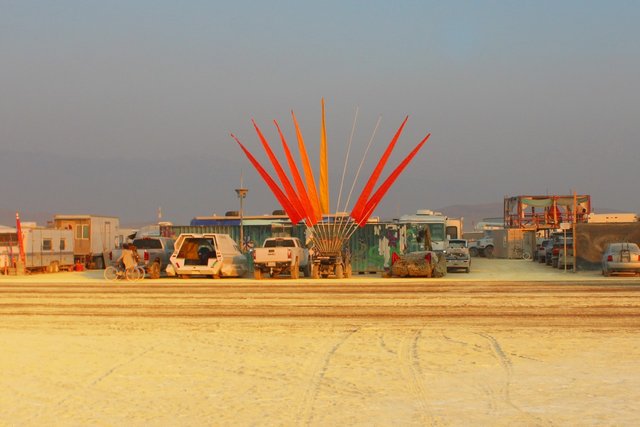
Photo by Ivan Cremer
I looked out of the entrance of my tent, breathing through my black plastic painter’s mask. It was dusk, the heat finally relenting. Relatively few dust storms this time._
The tent flap was a perfect circle. Soft blue light poured through the hole. I laid on my back on my twin-sized air mattress and interlaced my fingers around the back of my head so I could see out.
I did nothing for about forty five minutes. Just breathed into the mask. Before that, I hadn’t done nothing since I don’t remember. You look at a gorilla, it does nothing all day. We’re fucking monkeys man. We forget that sometimes.
The Idol
On the side of a porta potty I was pissing in, someone had written “Burning Man is the modern day Sodam + Gomora.” Below that, someone else had written, “Check Spelling.”
At the Man, sets of bells built into the walls play metronomic, vaguely eastern melodies, though they are almost drowned out by the thumping of roving techno. The Man, a three story tall faceless wooden robot, could not be a better representation of a false idol. Beneath the man is an egg.
On the structure surrounding the Man, there is graffiti written. It’s mostly corny sayings and empty effusions. Stuff like “I promise to love so forcefully and intensely that little revolutions are born in my wake,” “We are one,” “The 8 pillars of joy by the Dalai Llama and the archbishop Desmond Tutu…”
I spent about forty minutes reading these little sayings. I found only one reference to God: “Jah will provide…” So I pulled a pen out of my pocket and wrote “Jesus” on a random bit of scaffold. It felt like I was scrawling a swastika. I looked around guiltily to see if anyone had witnessed my transgression.
Burning Man is a beautiful face etched on the circuit boards of society. It is a practice Mars colony. In its beauty, it reveals a lot about both the present and the future. Its aesthetic perfection tells us where we are, and where we’re about to be.
#2
I got as close the fire as I could, trying to force the piss to dry. Techno from the red domed tent still pumped, but the ring of people around the fire was growing. I peed more than I cried on the burn, sucking in so much water from the bladder on my back, more sucking the more the drugs played their tricks. On my last trip to the port-a-potty, I had fallen in the darkness and peed literally all over myself. My male yoga pants were soaked through.

Photo by Ivan Cremer
The fire dried them and I sat down amongst the circle of cigarette smokers. It was my last night, I had get on the Burner Express at 11am the next morning. I yearned for civilization. I had become an effective moon ranger, scuttling around with my Christmas-tree bike, wardrobe of scarves, sucker tube, and alms cup, and it was getting easier, starting to feel normal. But the drugs and drinking were taking their toll. Over the course of that final Friday I had taken four tabs of acid, though another tab of acid at Burning Man feels like just another beer in real life. What I really craved was a return to a much grander illusion—the one where I lived a normal life which was under my control.
Some Russian women asked me for cigarettes. I don’t remember much about them besides that they were opposites. One tall and blonde and glamorous the other tiny, brunette, and squirrel-like. In my fanny pack I had been carrying around some printouts of poems that I wanted to read to someone, anyone, who would let me, both some of my own and some of Bukowski’s. As I chatted with the girls about Putin, hour creeping closer to sunrise, I realized this was my last chance.
I pulled out “Bluebird” and started to read. I made it about halfway through and the sobs came, a cascade of uncontrollable spasms. My years of no-cry muscle training swept away in an instant. The Russians liked it at first—“awww it’s okayyy, it’s okay,”—but as I repeatedly attempted and failed resume my reading what was at first cute became awkward. I literally could not make it through one more sentence. My throat pulsated with sobs. It was a good feeling.
“What is the terrible question that the void poses to man? It is the ancient riddle of the Sphinx to Oedipus. Man is interrogated about himself—does he know the name of the curious being that moves through time? Depending on his answer, he will be devoured or crowned. The void wants to know if man is equal to it, whether there are elements in him that no time can destroy.” — Ernst Junger
#3
After the Russians left me sobbing, it was around seven in the morning. I was all the way across the Playa, about a fifteen minute ride back to my tent. I still had to pack and somehow get myself through the morning heat to the bus stop, which was about a mile from my camp. I closed my eyes to check if the acid was still in play. Yep, still visions of undulating cartoon vaginas dancing under my eyelids.
Riding in the dark across deep Playa, all I could think about was home. All I wanted was to leave the void, to be in the arms of my girlfriend, to cuddle in our king size bed, to snuzzle our noses together, and to order a cheeseburger and have it delivered to me.
I made it to the bus station about an hour early. At this point I hadn’t slept in thirty-three hours, and hadn’t eaten in about fifteen. The substances were leeching out of me. I felt insane, on the edge. I hadn’t felt real air conditioning in seven days and yearned for the first breeze of it on the bus. I laid down right in the dust of the surprisingly sophisticated (given that it had been constructed just this week) bus station and leaned up against my suitcase and sucked in air through my black plastic painter’s mask. I tried to get a few moments of sleep. They didn’t come, of course, but the bus finally did.
A female volunteer in heavy makeup, bikini bottoms and a sparkling bra thing helped me onto the bus. The inside of my skull felt like a cotton swab. I sat down. A San Francisco consultant bro plopped down next to me. They said the air conditioning wouldn’t go on until we were off the Playa, which would take about twenty minutes, the longest twenty minutes of my life. The bro kept trying to make conversation, but every time I tried to respond my throat welled-up.
“Dude, if you keep talking to me, I’m warning you, I’m going to start crying,” I kept telling him, but he insisted on showing me photos, photos of Burning Man no less, on his phone. It was like his verbalizations were a string tugging on my cry reflex. I had gone from a proud, dour non-crier to a puddle of emotion. I could barely hold it in.
“Dude, I mean it’s fine if I start crying, I don’t care, but I’m just warning you,” I said. He clearly thought I was insane, or was insane himself, so he just laid it on harder. He showed me a picture of the temple, the place cryers sit around and sob for days, and a single solitary spasm snuck through my constricted throat. My eyes got a little wet. But then I closed them, and choked it all back down. We were almost in Reno.
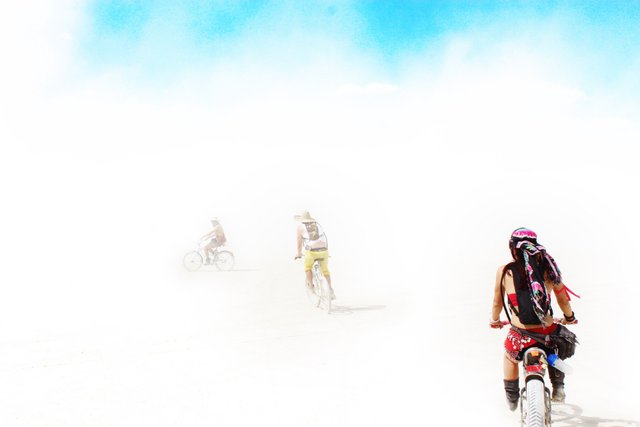
Photo by Ivan Cremer
*Note 1: in the clearest video from the Vegas shooting, a couple runs for their lives. They reach a hiding place, and the woman begins laughing. She says “Holy shit! That’s more excitement than I’ve felt the entire three days of Route 91 [the music festival]!” YouTube commenters attribute this seemingly bizarre reaction to adrenaline. I disagree. Entering a void—hell, if you will—and coming back, scathed or unscathed, is something that human beings are designed to do, but almost never experience in contemporary life. Here we have a woman who came to Vegas for something supposedly fun and exciting, a music concert, but there was something missing (as there always is at these sorts of events, which is why we drink ourselves into stupors). Her reaction is one any of us would have had. For perhaps the first time in her life, she has explored a truly unknown place—the center of a mass shooting—and survived unscathed. Don’t believe me? Read the stories of Londoners who stayed in London during WWII, despite copious bombing by the Nazis. Surviving each bombing, which the vast majority of individuals did, made them feel increasingly invincible. The Nazis thought it would demoralize the city, but it had precisely the opposite effect.
Note 2: You can listen to a Not a Huge Fan episode on my Burning Man experiences.
Upvoted ☝ Have a great day!
Nice write up about Burning Man. Watched the event develop for about 20 years but never went.
Interested in your publication model. Let me know how it works.
Hope you enjoy Steemit, stick it through for a while